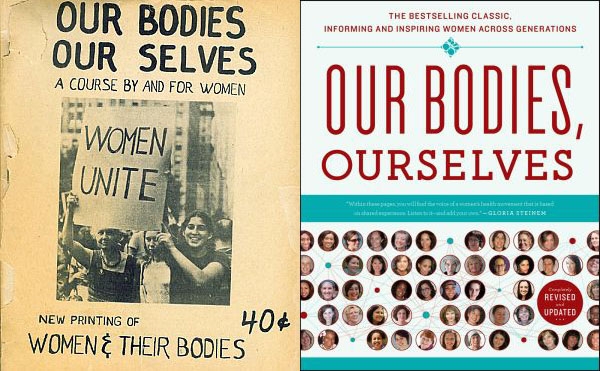Woman as Reason
by Terry Moon
Over 40 years ago, 12 Boston women got together to talk about women’s health. This was in 1969, when no one talked about women’s sexuality. Abortion was illegal and birth control had been legalized nationally—for married couples—only in 1965. Breast cancer was an embarrassment and not discussed; it was viewed as a shameful disease.
Those 12 women approached the subject as critics, making what they did a revolutionary act. As they tell their own story: “At a workshop on ‘Women and Their Bodies,’ we discovered that every one of us had a ‘doctor story,’ that we had all experienced feelings of frustration and anger toward the medical maze in general, and toward those doctors who were condescending, paternalistic, judgmental, and uninformative in particular. As we talked and shared our experiences, we realized just how much we had to learn about our bodies, that simply finding a ‘good doctor’ was not the solution to whatever problems we might have. So we decided on a summer project: we would research our questions, share what we learned in our group, and then present the information in the fall as a course ‘by and for women.'”*
They ended up self-publishing a 136-page booklet on newsprint that cost 40¢. It was so popular—and important—that they formed the Boston Women’s Health Book Collective and over the years published eight more editions of what became Our Bodies Ourselves.
SELF-DEVELOPMENT VS. CAPITALISM
This was not about money, this was about self-knowledge and self-development, about spreading the word that women could take control of our healthcare and bodies, and we could become the “experts.”
It didn’t take long for capitalism to try to fill the obvious need revealed by the feminist self-help health movement that flourished in the late 1960s and early 1970s, trying to submerge a movement driven by women’s desire to become whole, thinking, acting human beings under one driven by profit and more profit.
We’ve seen this history made explicit in the few days it took for a supposed charity created to raise awareness about breast cancer, to reveal itself as playing politics with Republicans, anti-abortion fanatics, and others who actually oppose women’s right to control our own bodies and health.
It may be true that when Nancy Brinker formed the Susan G. Komen Breast Cancer Foundation in 1982, it was to bring awareness of a disease that had taken the life of her sister, Susan Komen, when she was only 36. And there is no question that it did bring awareness of breast cancer front and center. But its decision to defund Planned Parenthood shows that it long ago transformed into its opposite and is now a barrier to helping women.
TRANSFORMATION INTO OPPOSITE
It is not that Komen “caved” to anti-abortion fanatics who demanded that they defund Planned Parenthood. It is that they agreed that they should, despite the fact that Planned Parenthood is a leader in testing poor women for breast cancer.
Their agreement was shown in hiring anti-abortion politician Karen Handel as their Vice President. She was the brains behind their defund-Planned-Parenthood strategy. Not only is Handel willing to sacrifice poor women’s health for her anti-abortion ideals, as the secretary of state for Georgia she was successful in disenfranchising thousands of Blacks, Latinos and the elderly. All this had to be known to Komen. Handel was simply a good fit for them.
Komen recently also pulled funds from embryonic stem-cell research centers. Its investment portfolio includes several drug companies, which is probably one reason it has worked diligently to undermine research aimed at finding the cause of cancer, not alone a cure, for example fighting “behind the scenes” to kill the Breast Cancer and Environmental Research Act.**
This isn’t alone a question of the transformation into opposite of Komen. It is what happens when a movement has to co-exist with capitalism, when instead of revolution, we get counter-revolution. Even many of those who begin with good intentions are co-opted. Nancy Brinker and her organization no longer work for women, they work to maintain their own power and influence and for the companies that fund them.
We can’t roll time backwards, but we can work to retake control of our bodies and lives. That is a revolutionary act.
* http://www.ourbodiesourselves.org/about/jamwa.asp
** Daily Kos, “Behind the Pink Curtain—Komen’s Political Agenda,” by Betty Pinson, Feb. 1, 2012, http://www.dailykos. com/story/2012/02/01/1060885/-Behind-the-Pink-Curtain- Komen-s-Political-Agenda

